Study 6 From The Book of Numbers
is: Numbers 9:15 – 10:36
1.
Israel were made very sure of
God’s guidance. Without the actual
symbols of cloud and fire can we claim the same assurance? Cf. Acts 16: 6-10;
Rom. 8:14. Why the repetition of the word ‘at the command of the Lord’?
2.
Notice the correspondences and
the differences between 10:14-28 and 2:3-31.
What is there in chapter 10 to show that, although God led and protected
the children of Israel, He did not expect them to be utterly passive and to do
nothing for themselves?
3.
What was the significance of
the trumpets (10:1-10)? Cf. Lv. 23:24; Nu. 29:1. It has been said, ‘When God
remembers, He acts’. Cf. Gn. 8:1; 19:29; 30:22.
Note. 10:35, 36. These were the word uttered publicly by Moses
at the beginning and end of each day’s journey. Note their expression of
dependence upon God’s protection and desire for His abiding presence.


